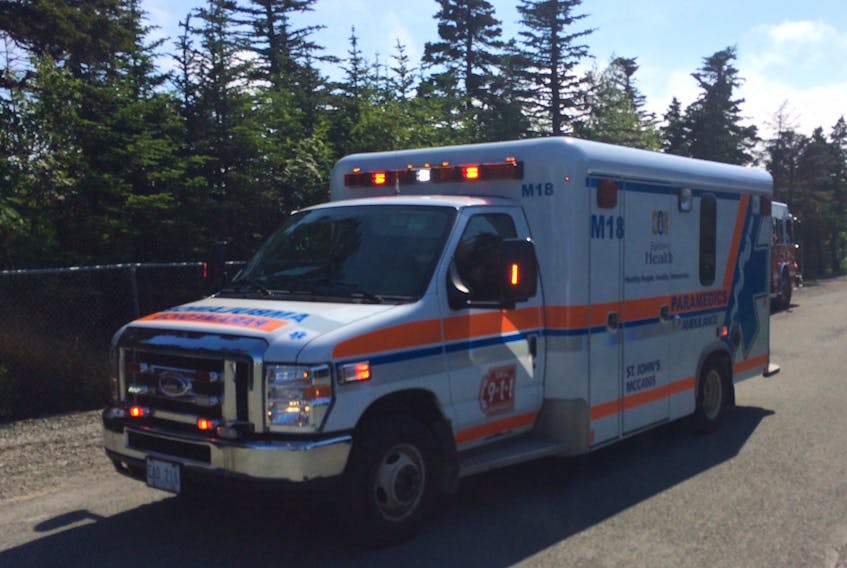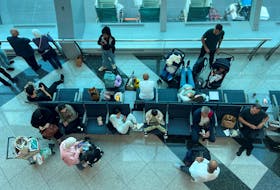Paramedics across central are hopeful 2019 will be a year of major changes for their practice.
The Emergency Health and Paramedicine Act passed in the House of Assembly on Dec. 5 of last year. The new act will establish into law many of the policies already practiced by ambulance providers in the province, as well as give the government more power in holding ambulance companies accountable and aligning them on the same standards.
In her 11 years of paramedic experience, Appleton resident Joanne Rogers sees potential for a lot of improvements with this new legislation and the regulations that will result from it.
“It’s going to be a process, but within the next year there’s going to be a lot of changes hopefully,” Rogers said. “I know they spoke with other provinces leading up to this act, and the goal is to make this the best system for paramedics across the country.”
Paramedic Association of Newfoundland and Labrador president Rodney Gaudet says one big take away from this legislation is there’s more oversight and accountability brought to the private ambulance services.
“There’s more consequences to the operation owners if contracts are not followed,” said Gaudet. “With the recent changes, all private ambulance services need to go through the same public procurement process as other government services.”

Currently, the Public Utilities Board issues ambulance licenses, but that authority will be in the hands of the Department of Health and Community Services with changes to the legislation.
According to Gaudet, the act is expected to go into affect this July, and while the legislation has been passed, there are many regulations currently being written to ensure the act is put into practice.
Self-regulation
Rogers has worked in both the public and private sphere through her employment with Central Health, private ambulance providers and on contract jobs with Muskrat Falls and offshore projects.
Of all her experience in the industry, self-regulation through the establishment of a “college of paramedicine” is a change Rogers sees as most important. This college would be a board of people determining the protocols for paramedics, rather than the current situation where protocol is at the behest of the doctor’s license that the paramedic is working under.
“Currently what we do, like whether we can give this drug or that drug, is all determined under the one doctor’s license,” she said. “Under a self-regulation board we can put our concerns to them and it’s decided from there whether we can do certain things.
“At the end of the day it’s going to be a good thing — people will look at paramedics as more of a medical profession. We can get away from this ambulance driver title we’ve had for so many years.”
Working with Central Health in Gander, Sean Bernard sees self-regulation as being crucial to advancing paramedic services in the province.
“Establishing that paramedics college is going to help advance our work greatly,” he said. “It gives us the legal ability to perform our scope of practice rather than working under the decisions of the doctor’s license.”
As well, under self-regulation Rogers says that a license fee including insurance would alleviate the financial concerns if a paramedic were to assist in an incident off-duty.
“If I’m driving and come up on an accident, under this self-regulation with my own license fee I’d have the insurance to help someone in that accident,” she said. “If I were to do this now and

something went wrong and I was sued. . . I’d be on my own.”
Looking ahead
In January, a series of meetings were held across the province by the Paramedic Association of Newfoundland and Labrador and manager of air and road ambulance services with the Department of Health and Community Services Wayne Young. The meeting for central paramedics was held in Gander on Jan. 9.
Gaudet says these meetings were held to inform paramedics of what changes are expected once the Emergency Health and Paramedicine Act takes affect. As well, Gaulet and Young took questions and concerns to prepare the regulations resulting from this new legislation.
“The final draft of the legislation has passed, but now regulations have to be made and are still being put through,” said Gaudet. “We have been working with government on these regulations to ensure they do have a positive outcome and effect on all our practitioners and patients.”
The Central Voice reached the Department of Health and Community Services for an interview with Young but the request was declined.
Richard Gill is president of Teamsters Union Local 855, representing over 160 private paramedics. He says one of the biggest concerns facing his members is the stress created when private ambulance companies compete with one another. For example, some ambulance services may dismiss a request to meet another service half-way if it entails a transfer fee.
He hopes the coming changes and any future legislation better address this concern.
“Competition between private ambulance companies does not allow them to work well together,” said Gill. “This competition should not be taking place — things ought to be done in the best interest of the patient.”
Issues around ambulance response time on the Baie Verte Peninsula area resulted in an hour-long delay in response to a mining accident last December. In light of this, Rogers says the concerns around rural and isolated areas of the province also need to be emphasised as these regulations are worked through.
“What works in St. John’s or Corner Brook or Gander cannot work in coastal communities with only two or three paramedics or whatever they have,” Rogers said. “Whatever the changes are, we can’t operate with less paramedics on the ground. That’s definitely an issue that has to be managed.”









